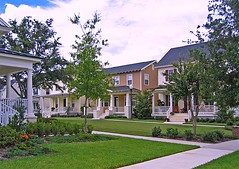"Growing Wealthier" report shows how smart growth can enhance prosperity

Posted January 19, 2011 at 1:31PM
Guiding the growth and development of cities and regions in order to make efficient use of land, take advantage of accessible locations, and provide transportation choices enhances community prosperity and generates economic benefits for local businesses, households and governments, according to a new report published today by the Center for Clean Air Policy (CCAP). The study, Growing Wealthier: Smart Growth, Climate Change and Prosperity, reveals how better land use planning and resulting reduced driving and are strongly interconnected with economic growth and a higher quality of life.
 In particular, the authors observe that application of smart growth principles can improve the bottom line
In particular, the authors observe that application of smart growth principles can improve the bottom line
for businesses, household budgets and government balance sheets by increasing property values, cutting fuel and infrastructure costs, creating jobs, enhancing public health and strengthening communities. Cities investing in public transportation and downtown development are experiencing cost savings, growing tax revenues, increased property values and booming retail sales, while pent-up demand for walkable communities is reshaping the real estate market.
Communities cited in the report as realizing the economic benefits of smart growth include:
- Dallas, Texas – downtown retail sales grew 33 percent a year after the light rail system began operation. (photo above)
- Sarasota, Fla. – downtown development costs were half that of suburban development while generating four times the tax revenues. (photo below)
- Portland, Ore. - a $100 million investment in streetcars helped attract $3.5 billion in private investments.
Growing Wealthier builds on the comprehensive 2008 report, Growing Cooler, which collected and presented extensive evidence linking smart growth with reduced global warming emissions. Growing Cooler was co-authored by CCAP's Steve Winkelman, who also co-authored Growing Wealthier.
The principal author of the new report is CCAP Transportation Analyst Chuck Kooshian. He and Winkelman encourage policy makers and practitioners to promote economic well-being by mixing land uses and providing a diversity of transportation and housing choices to enhance accessibility and promote travel efficiency.
Growing Wealthier challenges the misperception that increased driving rates are inherently linked with economic growth:
"While VMT [vehicle miles traveled] and GDP [gross domestic product] have grown concurrently since World War II and in lock step for much of that time, we present data showing that GDP began growing faster than VMT around 1996. According to U.S. Chamber of Commerce analysis, the importance of travel as a component of the US economy has been declining since the early 1990s, and is expected to continue to decline through 2030. Our analysis shows that states with lower VMT per capita tend to have higher GDP per capita. On a metropolitan level the data indicate no discernable pattern between VMT per capita and GDP per capita."
The report also examines how reducing “empty miles,” driving that contributes little or nothing to the economy, will produce positive economic benefits while helping to meet climate protection goals. Allowing more people to live closer to job centers can also boost employment rates and income levels for low-wage workers while reducing exposure to congestion for all workers. Smart growth policies are also shown to cut government infrastructure costs, enhance public health and conserve natural resources.
The report provides recommendations for the role of the federal government to “equip and empower” state and local governments to implement smart growth policies and realize their economic and livability benefits. The authors say the federal government should increase funding for research on the economic impacts of transportation and land use policies and provide technical assistance to help communities implement and evaluate smart growth and travel efficiency policies.
 For example, Growing Wealthier argues that government infrastructure programs – such as massive federal subsidies for transportation facilities, due for review by Congress in reauthorizing legislation – should reward those communities that make the most efficient use of resources to promote economic and environmental sustainability. As an example, the report cites the US Department of Transportation’s TIGER program, which awarded grants based to innovative projects that economic and environmental criteria, as a move in the right direction, as were the Sustainable Community Grants awarded by the department of Housing and Urban Development.
For example, Growing Wealthier argues that government infrastructure programs – such as massive federal subsidies for transportation facilities, due for review by Congress in reauthorizing legislation – should reward those communities that make the most efficient use of resources to promote economic and environmental sustainability. As an example, the report cites the US Department of Transportation’s TIGER program, which awarded grants based to innovative projects that economic and environmental criteria, as a move in the right direction, as were the Sustainable Community Grants awarded by the department of Housing and Urban Development.
“There are many steps we must take to ensure that our children inherit a planet and an economy with a bright future,” said CCAP transportation policy director Winkelman in a press release. “Investing the time and money to grow our communities to be more resilient, more efficient and more satisfying to their residents will offer a tremendous payoff.”
According to CCAP the new report was made possible by generous support from the Kresge Foundation, the Rockefeller Foundation and the Surdna Foundation. The executive summary and full report are available at www.ccap.org and at www.growingwealthier.info. For more information on CCAP’s transportation program, please visit http://www.ccap.org/transportation.html.
Move your cursor over the images for credit information.